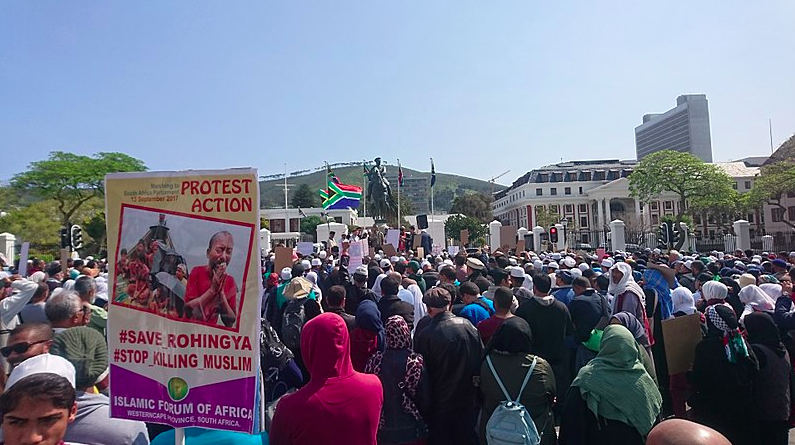Rohingya Muslims flee to Bangladesh, facing ethnic cleansing in Myanmar
Courtesy of Wikimedia Commons
A rally was held in Cape Town, South Africa last month to call for the protection of Rohingya Muslims in Myanmar. Myanmar’s military has engaged in a campaign of ethnic cleansing against their Rohingya Muslim population.
October 12, 2017
Over 412,000 Rohingya Muslims have fled from Myanmar to Bangladesh since Aug. 25 as part of an ethnic cleansing.
The Rohingya are an ethnic minority consisting mainly of Muslims, most of whom live in the Rakhine State of Myanmar. Myanmar’s military performed a campaign of ethnic cleansing, as the government believes that all Rohingya Muslims are illegal immigrants from Bangladesh. The military has committed many human rights violations, such as illegal killings, burning of buildings and sexual assault of women and girls.
“What we’ve been hearing about and seeing is crimes against humanity and ethnic cleansing,” Daniel Sullivan, Senior Advocate for Human Rights at Refugees International, said. “They’re absolutely not handling it right, and it’s the Myanmar/Burma military that is the cause of what’s happening today.”
An Myanmar presidential spokesman said that at least 176 Rohingya villages have been completely emptied and recently issued a statement condemning the human rights violations but not criticizing the military.
“I think ways we can help is donating, or just even raising awareness in your community because money isn’t always a way to solve a problem,” Harker United Nations Children’s Fund (UNICEF) club co-president Andrew Chang (11) said. “If you don’t do anything, then there’s really no chance that change can occur. But if you do something, then there’s always a chance that it can happen.”
A vast number of refugees in Bangladesh, including many of the 240,000 children, are sick, as they have no access to clean water or toilets. UNICEF has counted around 1,400 children who have arrived in Bangladesh with neither parent.
“I was [in Bangladesh] back in May and could already see that there were so many camps that were sort of makeshift camps that were set up, and the humanitarian needs were really stretched,” Sullivan said. “So now, on top of that, you have another 500,000 plus who have arrived in just the course of a month.”
The U.S. State Department said that the U.S. will contribute $32 million to aid the refugees.
“All those little bits of pressure build up and really can help make a difference,” Sullivan said.
This piece was originally published in the pages of the Winged Post on October 12, 2017.


















![“[Building nerf blasters] became this outlet of creativity for me that hasn't been matched by anything else. The process [of] making a build complete to your desire is such a painstakingly difficult process, but I've had to learn from [the skills needed from] soldering to proper painting. There's so many different options for everything, if you think about it, it exists. The best part is [that] if it doesn't exist, you can build it yourself," Ishaan Parate said.](https://harkeraquila.com/wp-content/uploads/2022/08/DSC_8149-900x604.jpg)




![“When I came into high school, I was ready to be a follower. But DECA was a game changer for me. It helped me overcome my fear of public speaking, and it's played such a major role in who I've become today. To be able to successfully lead a chapter of 150 students, an officer team and be one of the upperclassmen I once really admired is something I'm [really] proud of,” Anvitha Tummala ('21) said.](https://harkeraquila.com/wp-content/uploads/2021/07/Screen-Shot-2021-07-25-at-9.50.05-AM-900x594.png)







![“I think getting up in the morning and having a sense of purpose [is exciting]. I think without a certain amount of drive, life is kind of obsolete and mundane, and I think having that every single day is what makes each day unique and kind of makes life exciting,” Neymika Jain (12) said.](https://harkeraquila.com/wp-content/uploads/2017/06/Screen-Shot-2017-06-03-at-4.54.16-PM.png)








![“My slogan is ‘slow feet, don’t eat, and I’m hungry.’ You need to run fast to get where you are–you aren't going to get those championships if you aren't fast,” Angel Cervantes (12) said. “I want to do well in school on my tests and in track and win championships for my team. I live by that, [and] I can do that anywhere: in the classroom or on the field.”](https://harkeraquila.com/wp-content/uploads/2018/06/DSC5146-900x601.jpg)
![“[Volleyball has] taught me how to fall correctly, and another thing it taught is that you don’t have to be the best at something to be good at it. If you just hit the ball in a smart way, then it still scores points and you’re good at it. You could be a background player and still make a much bigger impact on the team than you would think,” Anya Gert (’20) said.](https://harkeraquila.com/wp-content/uploads/2020/06/AnnaGert_JinTuan_HoHPhotoEdited-600x900.jpeg)

![“I'm not nearly there yet, but [my confidence has] definitely been getting better since I was pretty shy and timid coming into Harker my freshman year. I know that there's a lot of people that are really confident in what they do, and I really admire them. Everyone's so driven and that has really pushed me to kind of try to find my own place in high school and be more confident,” Alyssa Huang (’20) said.](https://harkeraquila.com/wp-content/uploads/2020/06/AlyssaHuang_EmilyChen_HoHPhoto-900x749.jpeg)










